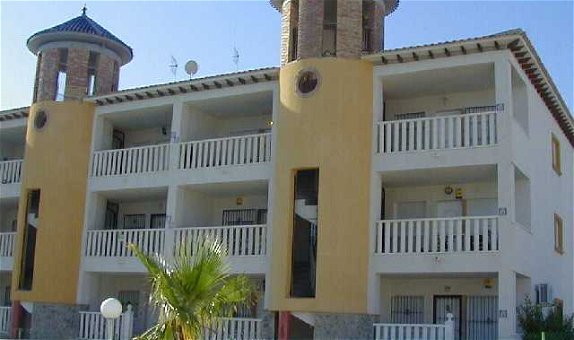This topic has been archived. This means that you cannot reply to this topic. Please feel free to visit our General La Marina discussion forum where you can start new topics and reply!
Spanish for beginners - don't get confused - Spanish Ways
I put the following together in a few idle moments, because although my Spanish isn't great and I make a lot of mistakes, I know enough to be disappointed at mistakes made by people I know or overhear. If any of the following helps you to avoid an error or two, then the time I've taken compiling it is worthwhile.
Because a noun ends in an 'a' doesn't mean it's feminine, e.g.
'El día' - that's why you see 'menú del día' and not 'menú de la día'
Another example, this one for the ladies:
'El problema' is masculine
Whereas 'La solución' is feminine
On the dot:
We all know that Spanish appointment times are flexible, so that 'a las doce' just means sometime after 12.00. If you want to be specific, say e.g. 'Estaré a las doce en punto' - I will be there at twelve o'clock exactly. Interestingly, our friend Ángel says that many Spaniards refer to an exact time as English time.
Mañana:
This one's bisexual. El mañana means tomorrow (or future). La mañana means morning. When used as an adverb, it also means tomorrow. So when someone says 'mañana por mañana', think of it as 'el mañana por la mañana' - tomorrow morning.
Pollo and polla:
Don't under any circumstances let your wife go into a butchers and ask for a 'polla grande'. She might come out some time later with a smile on her face, but you won't be having chicken for tea.
Introducir and presentar:
Introducir does mean introduce, as in bring in, but it also means to insert. So if you were to say to your mate 'te introduzco a Ana', you can guess what your friend Ana might think. Remember, when you're introducing people, use presentar.
Cono and coño:
If you want to ask for a big cornet from the girl in the heladería, make sure you ask for a 'cono grande', otherwise you might get a slap in the face.
Otro:
Otro (adjective & pronoun) is a simple word in Spanish that looks and sounds like its English equivalent, "other" or "another." But with this ease of recognition and use, many non-native speakers misuse otro by adding an article where it doesn't belong.
How do you say "another" in Spanish - as in "I'll have another (beer)."?
Answer: "Me tomaría otra (cerveza)."
Note that it's NOT: 'una otra' or 'un otro'. That's wrong. It would be like saying "an another" in English.
The time to use a definite article before otro is to distinguish between "another" and "the other" - if the distinction needs to be made. For example:
Otro día = "Another day"
But: El otro día = "The other day"
El otro día pensé en eso.
I thought about it the other day.
Using un or una when stating someone's occupation:
The corresponding word, "a" or "an," is required in English but not used in Spanish.
No soy marinero, soy capitán.
I am not a mariner, I am a captain.
Using possessive adjectives when referring to body parts and articles of clothing:
In English, we usually refer to a person's body parts or clothing using possessive adjectives. But in Spanish, the definite article (el or la) is used when the person the body part or item belongs to is obvious.
¡Abre los ojos!
Open your eyes!
El hombre se puso la camisa.
The man put on his shirt.
Preguntar and Pedir:
Preguntar means to ask (when you want to know something).
Pedir means to ask for (when you want something).
Le pregunté dónde vivía - I asked her where she lived
Le pedí un cigarrillo. - I asked him for a cigarette
Gustar:
This verb gives problems to every beginner in Spanish. And not only beginners - I've heard several people who've been here for years, and have attended lessons, get it wrong.
It's used in instances where we'd use 'to like (someone or something)', but it doesn't function the same way. This is because "gustar" belongs to a group of verbs that seem to be back to front to English speakers.
Its literal translation is "to be pleasing", and I strongly suggest that you re-phrase any English sentence from 'to like' to 'to be pleasing', as it's much easier to get to grips with this way. So to say "I like you" consider it as "to me - you are pleasing".
If you've had lessons, you've probably been given all the theory about subject, verb, and direct and indirect objects, and in my opinion this just makes matters difficult to get to grips with.
You need to remember that in English we like things, while in Spanish things are pleasing to /please us. However different the wording may be, the message is the same, and that's what counts.
In English, we say ?I like the table.?
In Spanish, we say "Me gusta la mesa", which translates literally as ?the table is pleasing to me.?
There's a big difference!
Gustar normally becomes either gusta or gustan, depending upon whether the subject of the sentence is singular or plural. Examples:
Me gusta el libro.
I like the book (the book is pleasing to me)
Te gusta el libro.
You like the book (the book is pleasing to you)
Nos gusta el libro.
We like the book (the book is pleasing to us)
Me gustan los libros.
I like the books (the books are pleasing to me)
Te gustan los libros.
You like the books (the books are pleasing to you)
Nos gustan los libros.
We like the books (the books are pleasing to us)
There are instances where you can use the second person of the verb. Example:
How do you say "I like you" in Spanish with "gustar"?
If you said "te gusto" you are wrong, because "te gusto" means "you like me" (I am pleasing to you).
You should say "me gustas" - I like you (you are pleasing to me).
I stress again - turn 'like' into 'be pleasing' and it's much easier to get right.
A few of the many other possible sources of confusion:
Asistir means to attend or to be present.
Asisto a la oficina cada día - I go to the office daily.
Assist translates as ayudar.
Atender means to attend to, and also means to serve, to pay attention to, to heed, or to care of.
Constipación and its synonym constipado both refer to a cold or catarrh. Constiparse means to catch a cold.
Constipation is el estreñimiento. Someone who is constipated is estreñido.
Embarazada means pregnant. It can also be a noun: una embarazada is a pregnant woman, an expectant mother.
Embarrassed is avergonzado, molesto, or incómodo. Someone who feels embarrassed tiene vergüenza or se siente avergonzado.
Fábrica is a factory, plant, or mill.
Fabric is tela, tejido (material), or fábrica, estructura (structure).
Mama refers to a breast.
Mama is mamá (see how important an accent can be?)
Nudo is a noun: knot, node, joint.
Nude is a noun or adjective: desnudo.
Receta means recipe or prescription.
Receipt is un recibo.
Sano means healthy, fit, or intact.
Sane is cuerdo, sensato, or de juicio sano. Someone who is sane is en su juicio or "in his right mind."
Tabla can refer to a board, plank, sheet (of metal), table top, or stage.
Table is una mesa.
El centro permanecerá cerrado doesn't mean it's closed permanently - it just means it's going to stay closed for whatever time period is specified.























 Register now for free to talk about General La Marina discussion and much more!
Register now for free to talk about General La Marina discussion and much more!















